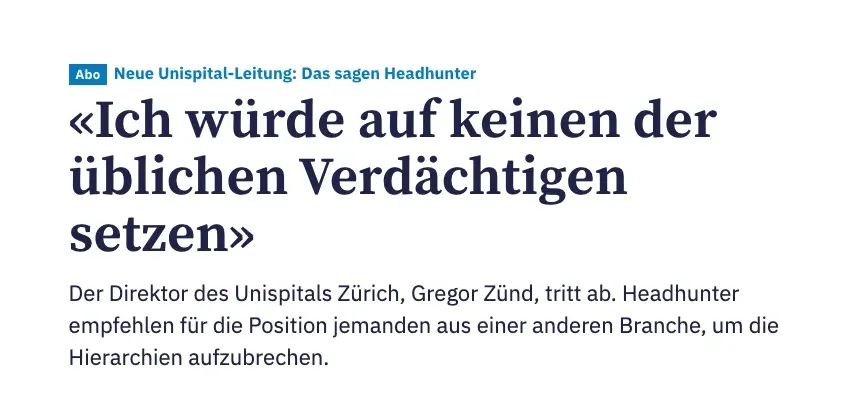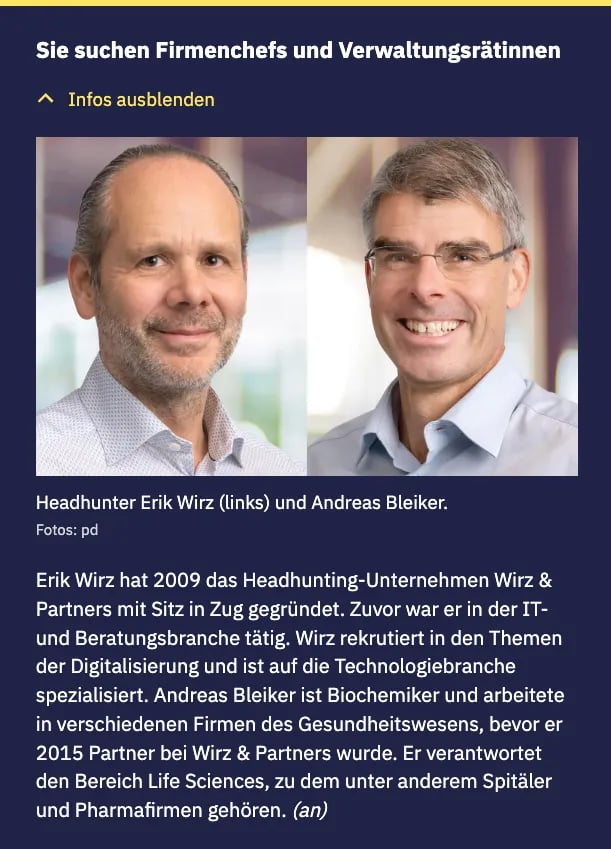
Tagesanzeiger, USZ Director Succession, Interview with Wirz & Partner
by: Susanne Anderegg Tagesanzeiger
Difficult new appointment: The USZ director is leaving. Headhunters may consider applications from non-hospital sectors.
Gregor Zünd will step down as CEO of the University Hospital Zurich (USZ) in the summer of 2023. This was announced by the hospital's board of directors on Tuesday. They have hired a headhunter to find his successor. This is a challenging task, as the USZ has a reputation for being difficult to manage. Erik Wirz and Andreas Bleiker from the headhunting firm Wirz & Partners explain what qualifications the person in this position should have.
Mr Wirz, Mr Bleiker, how do you find the right person for this exposed and demanding management position?
Erik Wirz: The University Hospital has often been in the negative news in recent years and the appointment is politically sensitive. I wouldn't necessarily choose someone from the usual suspects, i.e. poaching from another hospital.
What should the person be able to do?
Andreas Bleiker: The challenges at the USZ are not only medical and economic, but also cultural. Hospital structures are generally very hierarchical, which is no longer up-to-date. The CEO needs to be someone who can initiate change. We already have enough medical expertise in the USZ management. So it might be possible to go down a new route and bring in someone from another industry. Someone with experience in organisational development and leadership.
How should the hospital change?
Bleiker: It should be an organisation in which managers do not primarily defend their positions of power.
Wirz: A hospital has to be humane and efficient in the sense that patients get the treatment they need quickly and that the professionals involved communicate directly with each other.
What makes a good leader?
Bleiker: You cannot generalise, it depends on the situation. If an organisation is to change, as the hospital board has postulated for the USZ, it makes sense to bring in someone who has already gone through such a process in a large organisation.
Wirz: For me, emotional intelligence is paramount.
How do you determine whether someone is suitable on a human level?
Wirz: We do a lot of reference interviews where we ask about interpersonal skills such as frustration tolerance or empathy. What a person has done is more important to us than what they say in an assessment.
Are women better at this and therefore more in demand as managers today?
Bleiker: There are clients who explicitly prefer a woman. But we search the market without any gender bias. Ultimately, it has to be the best solution for the organisation.
Wirz: And in our experience, it's less about gender and more about character and where a person is in life.
Do you also look abroad?
Wirz: We search worldwide. However, for a hospital management position, someone from a different cultural background is generally unsuitable. In such cases, we would suggest a candidate from a German-speaking country. But it's up to the client to define the recruitment radius. We've even had cases where the required candidate had to speak a specific dialect.
Has the pandemic changed the way you work? Has it made it more difficult to fill senior positions in healthcare?
Bleiker: Good people, at any level, are always in short supply. However, there is certainly a market for CEO positions. Whether the right people want to move into the vacancies is another question.
Wirz: The CEO position at the University Hospital Zurich is particularly difficult to fill because it is politically exposed.

The interview was conducted by telephone by Susanne Anderegg. She is an editor and author in the Politics & Business department in Zurich, specialising in healthcare. She is also responsible for the trainee programme at the "Tages-Anzeiger".
